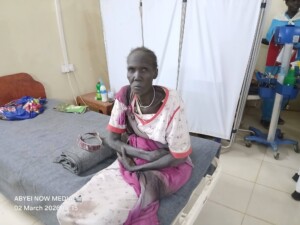Transfer of Sudan war crimes suspect to The Hague ‘a milestone’ – ICC Prosecutor Bensouda
The Prosecutor of the International Criminal Court, Fatou Bensouda, has hailed the surrender and transfer of former Darfur janjaweed leader Ali Kushayb, indicted by the court for crimes against humanity, as “a milestone in the Darfur, Sudan situation”.
 Ali Kushayb (C) in uniform with members of the Central Reserve Police (Abu Tira) in Darfur (File photo)
Ali Kushayb (C) in uniform with members of the Central Reserve Police (Abu Tira) in Darfur (File photo)
The Prosecutor of the International Criminal Court, Fatou Bensouda, has hailed the surrender and transfer of former Darfur janjaweed leader Ali Kushayb, indicted by the court for crimes against humanity, as “a milestone in the Darfur, Sudan situation”.
Kushayb, who fled Sudan for the Central African Republic (CAR) in February, was arrested on Monday in the town of Birao in the CAR, just 55km from the Sudanese border. The ICC confirmed that he “surrendered himself voluntarily”. He was immediately put on board an aircraft bound for the Netherlands where he has been in ICC custody since yesterday.
ICC prosecutor Fatou Bensouda, who has frequently expressed frustration at the lack of progress towards justice and ending impunity for atrocity crimes in Darfur, hailed the arrival of Kushayb in The Hague as “a milestone”.
In a statement on Tuesday evening, Bensouda expressed her satisfaction that “a milestone has been reached in the Darfur, Sudan situation”.
Bensouda expressed gratitude for the collaboration of the governments of the CAR, France, Chad, and the Netherlands, as well as organisations and individuals, “who contributed to this pivotal development”.

“I also express my appreciation to my dedicated team, along with colleagues from the Registry, whose tireless efforts in the exercise of our respective independent mandates, contributed to today’s development and successful transfer to the Court. Today’s outcome was achieved notwithstanding the complexities of the operation, not least in the midst of added complications presented in operating in the Covid-19 pandemic context. I am truly grateful for the professionalism and dedication of all colleagues who contributed to this effort,” Bensouda says.
‘The victims in the Darfur situation deserve to finally have their day in court’
“Kushayb’s surrender and transfer, almost two decades after his alleged crimes, is a powerful and sombre reminder that the victims of atrocity crimes in the Darfur region of Sudan have waited too long to see justice done. The victims in the Darfur situation deserve to finally have their day in court.
“The suspect’s transfer to the Court also sends a clear and unequivocal message that no matter how long it takes or the obstacles placed in our path, my office will not stop until the alleged perpetrators of Rome Statute crimes are brought to justice.
“Indeed, while many had either abandoned hope in the situation or actively sought to stifle progress, we maintained our focus and perspective, never giving up on our investigations despite cooperation challenges, and building the necessary networks and partnerships. These efforts have culminated in today’s outcome. Our commitment has been and remains unwavering.Bensouda explains that the court’s judicial proceedings will now follow in accordance with the requirements of the Rome Statute, and with full respect for the due process rights of the suspect, under the guidance and authority of ICC judges.
Tangible justice
In her statement, Bensouda reiterates her call on Sudan’s authorities “to ensure tangible justice for the victims in Darfur without undue delay,” underlining that “all the five remaining arrest warrants in the Darfur situation, against Omar Al Bashir, Abdel Raheem Hussein, Ahmad Harun, and Abdallah Banda, remain in force. As such, the government of Sudan remains under a legal obligation to transfer the four remaining suspects to the Court to stand trial.
‘Ending impunity for atrocity crimes is also essential to achieve durable peace and security in Darfur’
“Alternatively, under the Rome Statute, Sudan can demonstrate to the Judges of the Court that it is genuinely investigating and prosecuting the four remaining suspects for substantially the same criminal conduct alleged in their respective ICC arrest warrants.”
Bensouda says that governed by the requirements of the Rome Statute, all Darfur suspects against whom ICC warrants have been issued must be brought to justice through genuine proceedings either in a courtroom in Sudan or at the ICC in The Hague. “To this end, pursuant to the principle of complementarity and my mandate as ICC Prosecutor, I welcome dialogue with the government of Sudan.”
The ICC prosecutor pledges to do everything in her power under the Rome Statute “to secure justice for the victims in the Darfur situation. Ending impunity for atrocity crimes is also essential to achieve durable peace and security in Darfur.
“For victims of atrocity crimes and affected communities in many conflict situations around the world, the ICC represents a last beacon of hope for independent and impartial justice. Today’s development is significant also in that context, and embodies the resilience, tenacity and reach of justice, as well as the crucial importance of the ICC in the global fight against impunity, Bensouda concludes.
The prosecutor is scheduled to brief the UN Security Council today on the situation in Sudan and Darfur, so the timing of Kyshayb's arrest and transfer are fortuitous.
Indictments
Kushayb is the first Sudanese suspect to be transferred to the ICC. The indictment against him lists 50 counts on the basis of his individual criminal responsibility in war crimes and crimes against humanity.
ICC indictments are also outstanding against former Sudanese dictator Omar Al Bashir and several member of his deposed regime. Al Bashir, ruled the country for 30 years and was deposed by a military coup on April 11, 2019.
On February 11 this year, government negotiators and the Sudan Revolutionary Front rebel alliance agreed during peace talks on the Darfur track in the South Sudan capital of Juba, to hand Al Bashir and the other ICC indictees to the court in The Hague.
Al Bashir convicted in Sudan
On December 14 2019, Al Bashir was convicted on charges of corruption and currency irregularities by a specially-constituted Khartoum court , and sentenced to two years in a ‘correctional facility’ designed for older prisoners.
He is still being held in Khartoum’s Kober Prison, which became notorious under his regime for holding countless political detainees, many of whom were tortured or worse. Al Bashir is awaiting trial on further charges regarding the killing of demonstrators following the violent dismantling of the sit-in in front of the army command in Khartoum on June 3, 2019.
On March 31, the public prosecutor formally charged Al Bashir, several of his senior military aides, and a number of Islamist leaders of undermining the constitutional order more than 30 years ago. He also faces further charges for money laundering, corruption, and forbidden and suspicious wealth.
Last month, Sovereign Council spokesman and Deputy Chairman of the Anti-Corruption Committee, Mohamed El Faki, said that the transitional government does not have a stance against handing Al Bashir over to the International Criminal Court to stand trial. “However, the decision to transfer Al Bashir to the Hague is associated with national politics, legal, and social aspects,” he said.
Radio Dabanga’s editorial independence means that we can continue to provide factual updates about political developments to Sudanese and international actors, educate people about how to avoid outbreaks of infectious diseases, and provide a window to the world for those in all corners of Sudan. Support Radio Dabanga for as little as €2.50, the equivalent of a cup of coffee.












 and then
and then